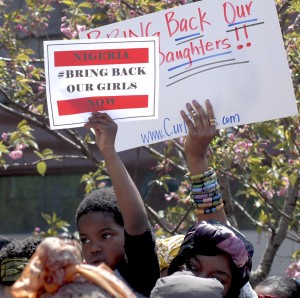An account of Nigeria’s abducted girls


“I abducted your girls, and I will sell them. I will sell them in the market, by Allah. There is a market for selling humans. Allah says I should sell. He commands me to sell. I will sell women. I sell women.”
Those were the words jovially declared by Abubakar Shekau, the supposed leader of Nigerian terrorist group, Boko Haram.
Weeks after Boko Haram took 230 Nigerian girls from their school desks, the world has finally realized the severity of the situation.
The problem, however, is not one of awareness, or the lack of — it is a multi-dimensional problem of insecurity, the aloofness and ineptitude of the Nigerian government and its army and a possibly sycophantic international community.
The incompetence of the Nigerian government and its army is evident not only in its response to the abduction of the girls, but also in its reactions to other acts of terror, including the two Nyanya bombings in the state capital, Abuja.
Moreover, in the days immediately following the kidnapping, the Nigerian military released a statement, which would later prove to be false, claiming most of the girls were rescued.
Their lies could have been forgiven if they proactively sought to rescue those girls in the aftermath of the kidnapping, but unsurprisingly, none of that heroism was present.
Miles away, Nigeria’s President, Goodluck Jonathan, basked in the gaudy comfort that comes with the position and was unable to act as a leader should.
For three weeks he did not offer a statement and he did not take any perceivable actions that would have assured the people of a possible solution.
Instead, his wife has tried valiantly to shut down the protests being organized by concerned citizens because they “are bringing shame and embarrassment to Nigeria.”
The situation becomes worse when you consider the Nigerian military’s extended history of brutality. In fact, many believe that Boko Haram’s history of abductions are in retaliation to the army’s similar actions towards wives and children of the group’s members.
Like Boko Haram they kidnap, torture and massacre innocent civilians. The only difference is they operate under the seal of a legitimate government, while Boko Haram operates anarchically.
Perhaps the real issue is deciding which of the two forces is the lesser evil: Boko Haram or the Nigerian Army.
Predictably, especially considering the incompetence of the Nigerian government, many have called on the international community, specifically the United States, for assistance.
However, in consideration of America’s recent history, this plan must be approached with caution, lest Nigeria becomes the new Iraq.
In place of turning to the self-proclaimed saviours of the universe, Nigeria should seek to engage with other, more reputable entities, such as the Economic Community of West African States, the UN or even the EU.
The harsh reality is that regardless of the sophistication of rescue attempts, it will be extremely difficult to bring those girls back.
Over a decade ago, the Lord’s Resistance Army, led by Joseph Kony, kidnapped hundreds of children, many of whom are still missing.
While they must not give up on the search for these girls, the Nigerian government — and the Nigerian people — should use their abduction as a trigger for future sociopolitical change.
They must focus just as much attention on constructing a framework to prevent the re-occurrence of such egregious crimes.

